Mobile commerce platforms have been gaining momentum in recent years, alongside the development of social media and the rising penetration rate of smartphones. For any B2C eCommerce today, focusing on mobile development is crucial for financial sustainability.
Mobile commerce statistics for 2024 say it all - we purchase more and more with our smartphones, and the margins from mobile channels are increasing. In our work as a custom eCommerce software development company, we see the reflections of these trends, with more and more companies seeking support in polishing their mobile channels.
In today’s article, we combine insights gathered through the course of our mobile commerce projects for the European market. mCommerce in Europe develops quite slowly - 54% of European internet users aged 16-64 purchase products online via mobile phone per week.
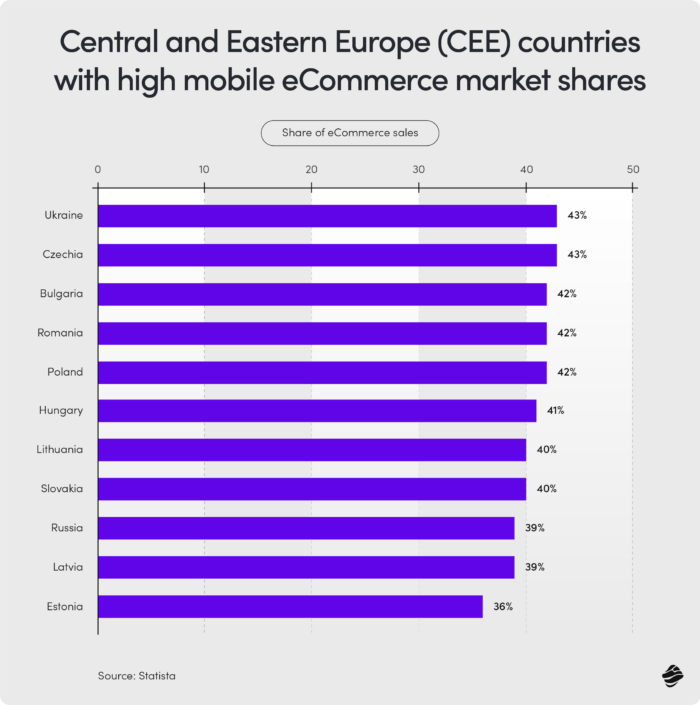
That positions the Old Continent far behind the Asia Pacific region (77%), Latin America (58%), or the Middle East & Africa (57%). However, it still leaves North America far behind, where only 44% of internet users make purchases via mobile phones.
Check what can ensure success in the mobile commerce market based on our projects with European customers like TUI, HelloFresh, Skyscanner, and Empik GO.
Project Overview: TUI, Skyscanner, and Empik Go Mobile Commerce Platform
Providing mobile commerce app development services, we have had the opportunity to work with companies across various niches, with different objectives and needs. As you will have the opportunity to see, these projects are as much united as they are divided. By comparing them, one can draw many interesting conclusions about the state of mCommerce in Europe and the future of this already profitable channel.
Let's start with the basics. Here is an outline of the projects carried out by Miquido, through the lens of which we will analyze the European mCommerce market:
- TUI: The goal was to create an all-in-one travel management app that simplifies booking and managing trips, providing users with a seamless travel experience.
- Empik Go: The objective was to develop a user-friendly ebook and audiobook reader app that provides a vast library of digital content.
- Skyscanner: We developed a solution that enhanced the flight booking experience, making it more intuitive and efficient.
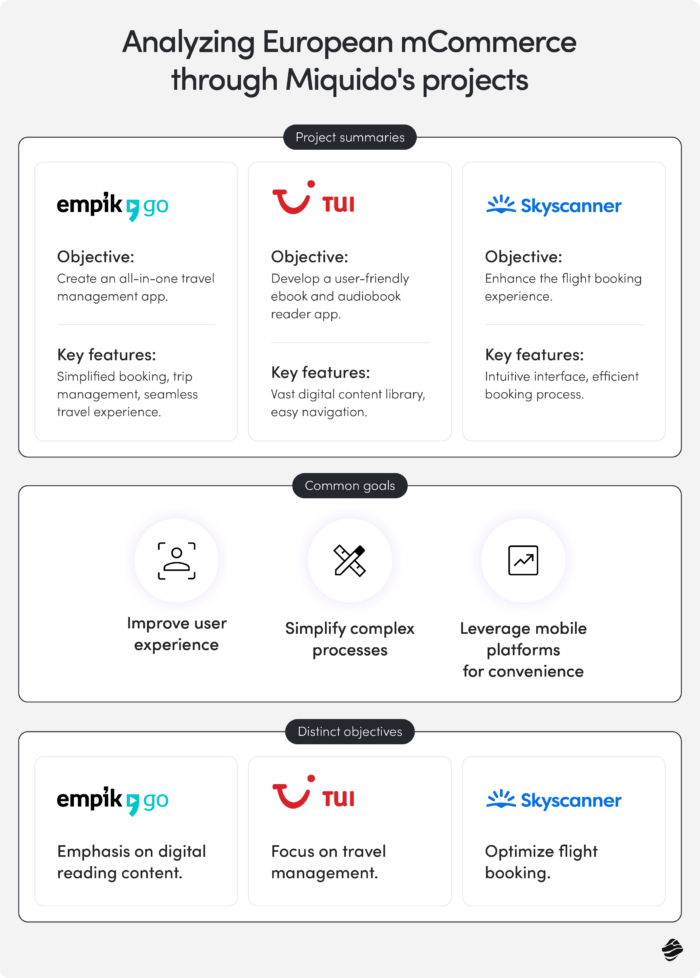
Challenges Faced: Our Mobile Commerce Platform Development Experience
For a mobile commerce platform to fulfill its main function - facilitating purchase - it must be properly constructed and tailored to the specific needs of mobile users. Meeting these conditions can be a significant challenge even for the most experienced companies. Inherited practices from traditional eCommerce can sabotage the success of the developed app. Therefore, it is worth reaching out to an experienced partner and together reaping the benefits of mobile commerce.
What challenges do we most often see among companies wanting to develop their mobile commerce platforms? They are most often related to UX, performance, and security. Mainly because the conditions associated with devices force software providers to adopt completely different strategies.
UX, Security, Performance - the Essential Trio for Mobile Success
Mobile devices, due to their specificity, give eCommerce providers the opportunity to implement advanced personalizations. They can include advanced functionalities such as artificial intelligence, computer vision, or voice recognition in their applications. However, this requires access to hardware features and the use of local storage, which can pose a vulnerability in the context of cyber threats.
In mobile applications, any shortcomings in terms of UI and UX are much more noticeable due to the limited interface. This means a higher risk of churn. From experience, we know that the mobile user is ruthless - if something bothers them in the app, they will switch to another without sentiment. Therefore, it is crucial to ensure intuitive navigation, streamlined onboarding, seamless checkout, and impeccable performance (with a particular emphasis on loading speed).
TUI, Skyscanner, and Empik Go: Key Challenges in These Mobile Commerce Platforms
Every project is a fascinating adventure from which one can gain a lot of valuable knowledge for the future. Here are challenge-related lessons learned from our key European eCommerce projects.
TUI
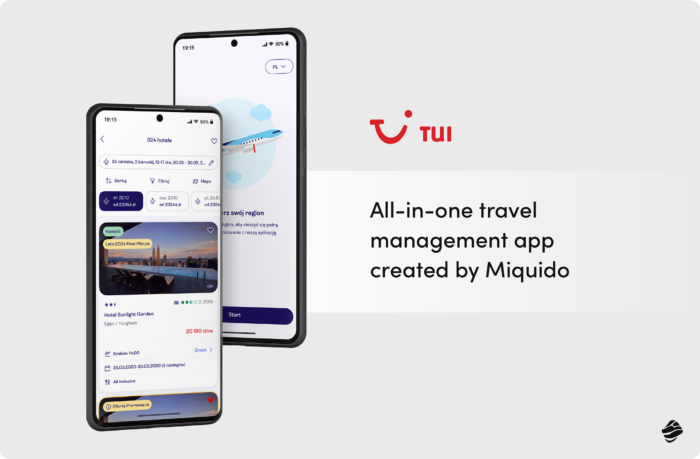
In the case of TUI, our role was to facilitate the transition from a desktop-centric system to a mobile-first approach. Our client, a renowned travel agency, acknowledged the influx of mobile customers and decided to meet their needs.
Although it might seem that only a few adjustments are needed, in reality, such projects are often a bigger challenge than creating a mobile solution from scratch. It is necessary to maintain maximum consistency with desktop solutions so that the transition between channels is natural and seamless for the customer. One must understand their habits while keeping in mind the key principles of mobile commerce design when integrating complex travel management features.
Skyscanner
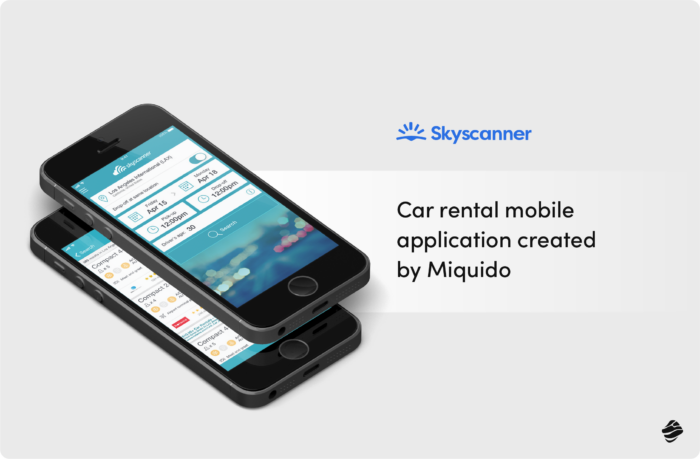
When supporting Skyscanner, the key challenge revolved around providing customers with a mobile app that facilitates managing their car rentals. It is a complementary part of a bigger module solution that enables booking flights, hotels, and car rentals in a smooth hassle-free manner. Skyscanner built its popularity around promoting flight deals.
The brand’s buyer persona largely consists of frequent travelers and budget-conscious tourists. A crashing app or slow loading times are their worst scenario. Thus, reliability, speed, and a seamless booking experience are equally important in this case.
At the same time, Skyscanner wanted to monetize the potential of car rentals, and the user experience was a significant barrier on the path to higher margins and engagement. Our challenge was to optimize the interface for smaller screens and improve its navigation to enhance these key performance indicators.
Empik GO
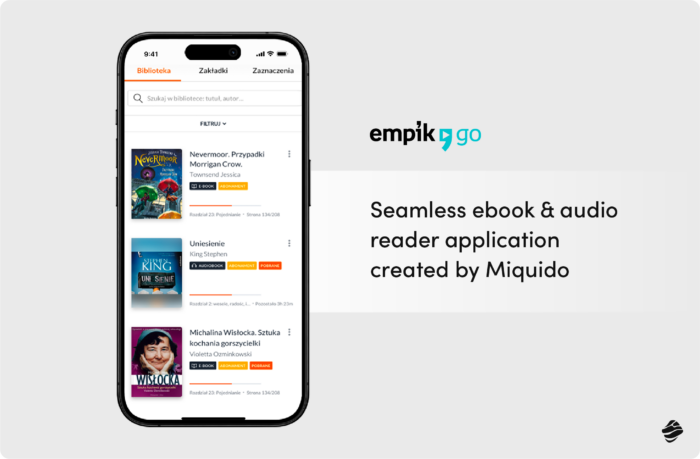
In the case of Empik GO, the key challenge was managing a vast library of digital content, ensuring stability and performance under heavy usage. A very important aspect in the context of mobile commerce platforms used for consuming various types of media is peak times. This is the ultimate test for any solution.
For ebook readers, the most critical moments are evening hours and commute times. It was crucial to ensure that users did not feel the impact of increased traffic. At the same time, the seamless user interface needed to accommodate diverse needs and ensure both an inclusive reading and listening experience for all users.
Solutions Implemented: How We Overcame Mobile Commerce Challenges in Our Projects
As in most of our projects, the key was selecting the right technologies - those that help us meet the key challenges while enabling us to implement them effectively and quickly. Performance and stability were crucial in all three projects. Therefore, we chose native development languages (Swift for iOS and Kotlin for Android). Providing direct access to platform APIs and hardware, they allow developers to optimize app performance and take full advantage of device capabilities.
To address the challenges with Skyscanner’s outdated Car Rental application, the development team updated the app using modern programming languages—Java for Android and Objective-C for iOS. By integrating new frameworks and tools, they significantly improved the user experience and introduced innovative features, setting Skyscanner Car Rental apart in the market.
User Experience and Design
User-centric design, intuitive interfaces, and continuous user feedback integration - these are the ultimate practices that we applied. For TUI, this involved advanced search features, detailed filtering options, and the introduction of myTUI for personalized recommendations, ensuring a smooth and tailored booking experience.
Skyscanner focused on a robust search feature for rental offers, detailed comparison, and filtering options (based on fuel policy, mileage, provider rating). Developing its module for booking rental cars, we focused on a clean, simple user path and navigation.
Both projects utilized consistent design principles, but TUI concentrated on travel management while Skyscanner emphasized flexible and last-minute rental services. Each solution prioritized delivering high-quality, personalized services to meet user needs and preferences, highlighting similarities in user-centric design and differences in service-specific features.
Aligning UX With the Key Objective of the Mobile Commerce Platform
In the case of Empik GO, the content should take center stage. Our design was meant to enable that. Knowing the importance of intuitive design for the success of the project, we started with a comprehensive UI & UX audit. The number of interface elements is reduced to a minimum and the entire app is designed in such a way as not to distract the user. It also has a function very important from the perspective of Empik, which primarily operates as a marketplace focused on culture. Its Empik GO app is synchronized with the user’s empik.com account, enabling digital purchases to appear directly in the library.
Results and Outcomes: Key Success Metrics of TUI, Skyscanner, and Empik GO Mobile Commerce Platforms
As you can see, the approach to developing all three projects repeats itself in some aspects, despite visible differences. And in each case, it has definitely paid off! Each created application has achieved great success, bringing significant benefits:
- Skyscanner has significantly expanded its user base, welcoming 1 million new users and serving 100 million app users across 30,000 airports and cities globally.
- Empik Go is now the largest base of audiobooks and ebooks available in Poland, with a 4.7 rating on the App Store, over 1 million downloads on Google Play, and 100k ebooks available.
- TUI's mobile app has received excellent feedback, boasting a 4.7 rating on Google Play with over 500,000 downloads, and a perfect 5.0 rating on Clutch, reflecting its popularity and user satisfaction.
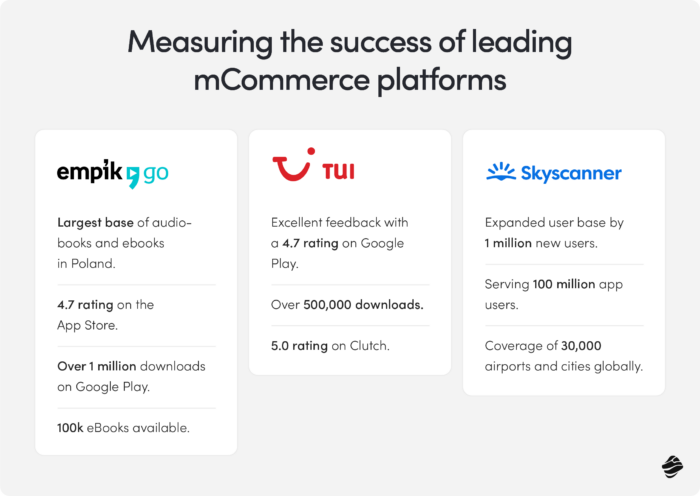
Lessons Learned: Use the Insights From Our Mobile Commerce Projects
- Adopt a mobile-first approach
Prioritize mobile development to cater to the increasing number of mobile users. Ensure consistency across all platforms, making the transition between devices seamless for a unified user experience. - Prioritize performance and reliability
Mobile apps must be optimized for speed and stability. Users expect quick loading times and a smooth, uninterrupted experience. Ensuring that your app can handle heavy traffic without issues is crucial for maintaining user satisfaction and retention. - Focus on user experience and intuitive design
A well-designed, user-friendly interface is essential. Simplify navigation, streamline the onboarding process, and ensure that the checkout flow is smooth and efficient. A positive user experience encourages engagement and reduces the likelihood of users abandoning the app. - Adapt to user behavior and peak usage times
Understand your users' habits and design your mobile commerce platform to handle peak usage times effectively. This involves optimizing your infrastructure to manage high traffic volumes during busy periods, ensuring that the app performs well under stress. - Implement personalization and user-centric features
Personalize the user experience by tailoring content and recommendations based on individual preferences and behaviors. Personalization enhances user satisfaction and can lead to increased engagement and loyalty. - Leverage advanced technologies thoughtfully
Utilize advanced technologies like AI, machine learning, and data analytics to offer innovative features and personalized experiences. However, be mindful of potential security concerns, especially when accessing device hardware and storing user data. - Ensure Cross-Platform Consistency and Integration
Maintain a consistent experience across all platforms, ensuring that users can seamlessly access their data and content from any device. This includes synchronizing user accounts and settings, which helps provide a cohesive and integrated experience.
What Will Future Bring for Mobile Commerce Platforms?
Everything indicates that mobile commerce will continue to grow intensively in the near future. The prevalence of virtual assistants will increase, and dynamic content will become commonplace in the era of widely accessible generative artificial intelligence.
It will also become increasingly difficult to stand out from the digital eCommerce crowd. However, there are things that never go out of trend, and although they are not immediately noticeable, they ultimately determine user satisfaction, churn, and conversion.
Optimal UX, performance, and security are the key areas to focus on! We can help you implement these principles in your project. We understand what is mobile commerce and would love to use the knowledge gained from numerous projects to help you achieve success.










